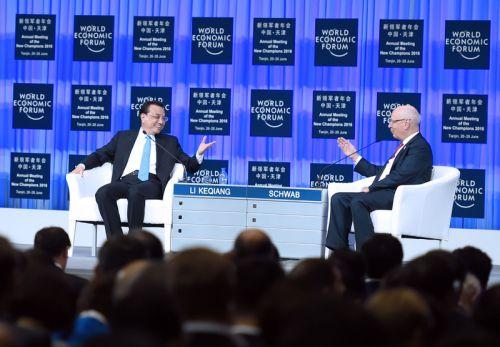
(Photo: Chinese Premier Li Keqiang (L) talks with Klaus Schwab, World Economic Forum (WEF) founder and executive chair, at the opening ceremony of the Annual Meeting of the New Champions 2016, or Summer Davos Forum, in Tianjin, north China, June 27, 2016)
TIANJIN, June 25 (Xinhua) -- China's 13th Five-Year Plan reflects its ability to embrace the new industrial revolution and its growth philosophy will help it play a leading role in the process, World Economic Forum founder and executive chair Klaus Schwab said Saturday.
The Fourth Industrial Revolution is not science fiction -- we are already in the midst of it, he told Xinhua in an exclusive interview ahead of the upcoming Annual Meeting of the New Champions 2016, also known as the Summer Davos Forum.
"It will not only change what we are doing and how we communicate, but the whole of society and our identity," he said.
More than half of the Chinese population are prepared for the Fourth Industrial Revolution and the 13th Five-Year Plan reflects this ability, he added.8 The blueprint, released last year, outlines China's development path for the next five years, with growth driven by innovation, coordination, green development, opening up and sharing.
Schwab expects the five principles to be beneficial to China's future economic growth, and among them, innovation is the most important principle to the progress of the Fourth Industrial Revolution.
The new wave of technological developments will not only bring opportunities such as increased productivity, but might widen the gap between the rich and the poor due to exposure to the latest tools, he pointed out.
Therefore, sharing is important. Governments should ensure the benefits of new technology are shared domestically and globally, he said.
There might be some layoffs due to technology such as robotics. The process will be a kind of destructive creation, with old jobs reduced and new jobs created. The challenges lies in the different speeds of the two process, he said, adding that the government and business communities should ensure people are retrained and new jobs created.
Building a green economy should be the goal of all efforts, and that will take coordination and synergy between governments and the business community. More than that, there needs to be more networking, not only within a country, but also on a global scale, thus, underscoring the need to continue to open up, Schwab said.
China is one of the largest markets for robots and is supplying the world in many other technological areas, said Schwab, who was impressed with the flexibility and reliability of the latest drone product developed by the Shenzhen-based technology firm DJI, a leading manufacturer of commercial and recreational drones for aerial photography and videography.
"I think China can play a leading role in shaping the Fourth Industrial Revolution," he said.
Meanwhile, as China is part of the global economy, it should facilitate global dialogue and cooperation to manage development within a fair environment, Schwab added. Enditem




 A single purchase
A single purchase









